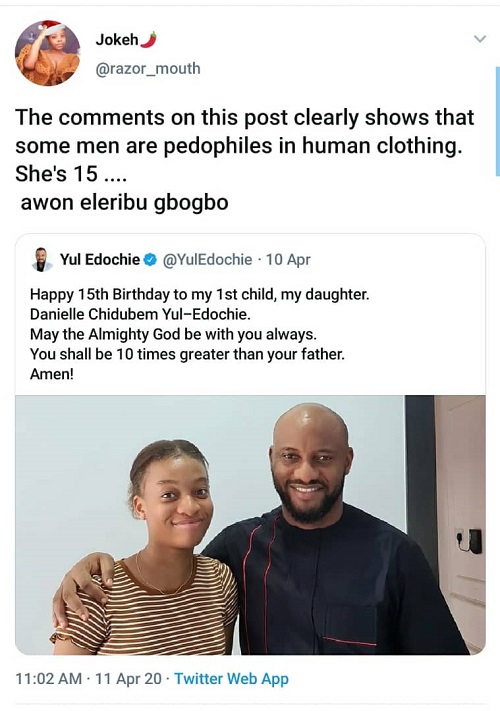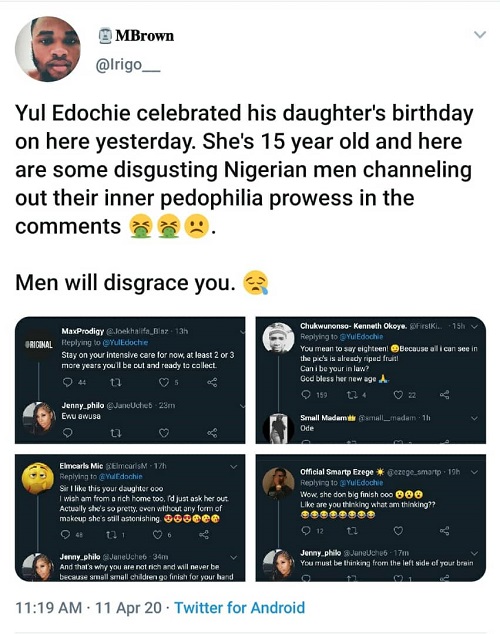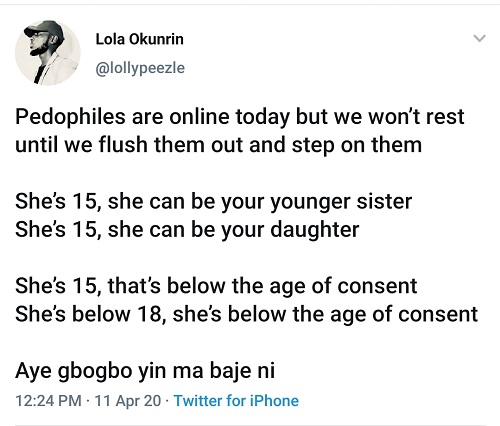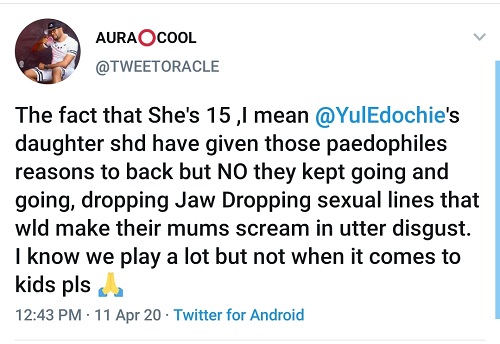WHAT IS NOT PAEDOPHILIA
On the 11th day of the April of 2020, I came online to “She’s 15” trending on Nigerian Twitter. What had happened? Who was 15? And why was it on the lips of Nigerian tweeps. A little more scrolls and I found out that Yul Edochie, a Nollywood actor, had uploaded a photo of his beautiful 15-year-old daughter, Danielle, in a happy-birthday tweet, only to be followed up moments later by sexually inappropriate comments from a number of men. It was a sad thing to go through – adults sexualizing children on the internet – but also troubling was the way the word “paedophilia” was thrown up and around the timeline as the most preferred descriptive term for those men who were found wanting.



Outraged Nigerians saw the tweeps as potential or actual predators, and Danielle, a victim. And because there is something intensely troubling in the reality of a child (taken to be any individual less than 18 years old) being sexually abused by an adult, Nigerian Twitter users intolerant to sexual abuse decided to call these folks out, and in so doing, labelled them paedophiles and their actions, paedophilia.
I remember thinking: do these people know who a paedophile is? Do they understand the biology of paedophilia? Do they know the implications of calling everyone who has something sexual with an underage individual a paedophile?
The first time I encountered an adult person who admitted to having sexual attraction to a child was in my penultimate year in medical school. I recall the cocoa-coloured man, probably thirty-something, who was accompanied by an older woman – his mother, I presumed – and who seemed to me so gentle, so kind, I was shocked to hear his presenting complaint to the psychiatrist: an irresistible urge to ‘touch’ children (his little niece – about nine or ten years old then – being case in point). After the consultation, I turned to my teacher, Dr. X and asked, “Ma, what is the reason for this type of condition?” And she cocked her head to one side and declared, “Take it home as an assignment, you will tell me about it on Friday.”
Doing this homework brought me in contact with terminologies such as paedophilia, which is popularly but inaccurately used to describe any form of sexual interest in, or sexual activity with, a minor; the less talked about hebephilia and ephebophilia; and the grossly underused legal terminology, child sexual abuse.
Paedophilia is strictly a medical jargon. It “is NOT a criminal or legal term.”(1) It is a psychiatric disorder, with a set of defining criteria. The Diagnostic Statistical Manual of Mental Disorders (DSM-5) defines paedophilia as a paraphilia in which the patient reports recurrent and intense sexually arousing fantasies and urges involving sexual activity with a prepubescent child (generally less than 13 years old) among other criteria.(2) This means that for any condition or situation to be labelled “paedophilia”, it has to fulfil a set of diagnostic criteria, and the tag has to be by a medically qualified person (or psychiatrist). Consequently, a “paedophile” is, strictly, a term for a person who suffers from this disorder and NOT a slang for any adult who is sexually involved with a minor. The latter situation – sexual contact or activity with a minor or individual who has not yet reached the age of legal consent (which differs between legislations) – is more appropriately called child molestation or child sexual abuse, and these are legal terminologies and criminal activities, and the perpetrators of these crimes are, and should be called, child sexual abusers or child molester (not paedophiles).
Note how the term “paedophilia” medically and basically describes the attraction towards prepubescent children, and not the act of sexual abuse itself.
Paedophiles do not decide to develop their abnormal attractions, and their interests often begin during their teenage years, when they do not clearly see the peculiarity of their sexual attraction to younger children. However, as they grow into adulthood, they realize the persistence of their sexual interest in children, despite their maturation, and are usually shaken or distressed by this realization, and, sadly, might go on to act on them.(3)
It is important to be clear on one thing: sexual contact or activity between an adult and a child of any pubertal status and for any reason whatsoever is morally wrong, and illegal! This is not because an adult cannot be sexually attracted to a minor; individuals who are not up to the legal age of consent (which differs between legislations) but who have fully developed sexual organs and personalities are capable of evoking sexual attractions in a healthy adult. However, the illegality and criminality of sexual activity between an adult and a minor is simply because:
1. A minor is deemed by law to be unable to give informed consent to sexual activity with an adult, because of the power imbalance that exists between both parties in favour of the adult, and also because the minor is unlikely to be knowledgeable enough about the activity and the implications thereof to give an informed consent about it.
2. Mere sexual attraction to a minor (generally including paedophilia, hebephilia, or ephebophilia) is completely different from sexual activity to a minor. While the former is in and of itself generally harmless and not within the control of the individual,(4) the latter is a voluntary, dangerous endeavour that negatively affects the physical and psychological well-being of the child.
PS: Ephebophilia, the sexual attraction to post-pubescent individuals or mid-late adolescents, is not a psychiatric diagnosis,(5) while Hebephilia, the persistent sexual attraction to pubescent children (typically 11-14years old), is very much debated as to whether it should be classified as a paraphilia or mental disorder.(6)
It is also important to distinguish paedophilia from child sexual abuse or child molestation. Not all paedophiles go on to become child sexual abusers or molesters (even though most of them do) as some paedophiles never get to act on their fantasies and urges. In the same vein, not all child sexual abusers are paedophiles. Individuals who have sexual contact with children may do so for various reasons that do not include the persistent, intense sexual urges and fantasies involving prepubescent children. Some child sexual abusers do so under the influence of psychoactive drugs, or due to mental retardation, or as a way of seeking revenge against the child’s loved one.(3) Therefore, the term that should be used by the public for anyone who sexually abuses a child is “child sex abuser/offender or child molester” and such a person should only be tagged a “paedophile” if it is categorically stated by qualified medical personnel (after evaluation, of course) that the underlying reason for their immoral actions is the psychiatric disorder, paedophilia.
Paedophilia is said to be one of the most stigmatized mental disorders,(7) and persons who are tagged paedophiles are attacked with severe rage, fear, stigma, discrimination and social rejection, whether or not they are offenders who have committed child sexual abuse. In fact, some surveys have ranked paedophilia as morally worse than murder.(8) There is a well-known support group called Virtuous Paedophiles whose members – who are paedophiles – believe that sexually abusing a child is a moral wrong. And while this is the case with a good number of paedophiles out there, mislabelling all child sexual abusers and attaching stigma to this label tells a different story; the wrong usage of the term, “paedophilia” does not allow for the important demarcation between attraction to prepubescent minors, attraction to post pubescent minors, and the actual sexual contact with a minor,(9) – all of which shouldn’t be looked at through the same lenses.
The call for the clear differentiation of paedophilia from child sex abuse/child molestation isn’t just for semantic purposes. Rather, it is because there are well noted negative implications of throwing every child sex abuser/offender into the much despised box that is paedophilia. Firstly, the conflation of both issues does not help individuals with the disorder. Many paedophiles – bearing in mind that they (who need medical help) cannot be distinguished from child sex offenders who are not paedophiles (who should face the law) in the eyes of the public – are less likely to seek help for their condition. The stigma, stereotypes, prejudice and discrimination reduce the mental stability of the sufferer and discourages them from seeking help.(7) And this could negatively impact child sexual abuse prevention because, secondly, failing to seek treatment for the abnormal sexual attraction has been said to make the act of child sexual abuse more likely to happen, thus making children the end-victims of the process.
So should we have referred to the men who sexualized Yul Edochie’s daughter on Twitter as paedophiles?
No.
In summary, this write-up does not seek to normalize paedophilia. It only says that paedophilia is very different from child sexual abuse and both terminologies should not be conflated; that the former (without the latter) should not be stigmatized, even as it is unhealthy, because doing so maybe harmful to the individuals that suffer from the disorder (like every other medical condition), and in the long run, detrimental to the children whom we are trying so hard to protect in the first place.
Written by Mazpa Ejikem, Twitter: @mazpa_ejikem
REFERENCES
- Hall RC, Hall RC(2007). “A profile of paedophilia: definition, characteristics of offenders, recidivism, treatment outcomes and forensic issues”. Mayo Clin. Proc. 82 (4): 457-71.
- American Psychiatric Association. Diagnostic and Statistical Manual of Mental Disorders, Fifth Edition. 5th Washington D/C. American Psy Ass; 2013; 685-705.
- Michael Gelder, Nancy Andreasen, Juan Lopez-Ibor, John Geddes. New Oxford Textbook of Psychiatry 2nd Oxford University Press.
- Fagan P J, Wise TN, Schmidt CW, Berlin FS (November 2002). “Pedophilia” JAMA 288(19): 2458-65.
- Miller S (2018). The ASAM Principles of Addiction Medicine. Lippincott Williams & Wilkins. P. 1713.
- Stephens S, Seto MC (2015). Phenix A Hoberman H (eds.). Sexual Offending: Predisposing Antecedents, Assessments and Management. Springer. pp. 29-41.
- Jahnke, S., Hoyer, J. (2013). “Stigma against people with pedophilia: A blind spot in stigma research?”. International Journal of Sexual Health. 25 (3): 169-184.
- Seto, Michael (2008). Pedophilia and Sexual Offending Against Children. Washington, DC: American Psychological Association. p. vii.
- Lanning, Kenneth (2010). “Child Molesters: A BehavioralAnalysis” (PDF). National Centre for Missing & Exploited Children.
About author
You might also like
NO HONOUR IN THE BLOOD
Circumstances following my father’s death have caused me to have to make some major life changes, some of which has made me something of a nomad in Lagos. I’ve been
FINE BOYS COME WITH A LOT OF BAGGAGE
Let me tell you about Mo. Mo is that kind of guy you walk past and can’t help but look back so you can check him out some more. This
That Article About Relationships and Friendships
Titled ‘Love In Periphery: Gay Relationship, Straight Friendships’, this piece was originally published on huffingtonpost.com. read and let us know your thoughts. * A good friend of mine called me










7 Comments
Mitch
December 14, 08:55👏👏👏👏👏👏👏👏
This was an education, Mazpa.
Thank you for this!
Delle
December 14, 09:22Thank you, Mazpa ❤
Swan dagger
December 14, 10:00can’t forget the day, some years ago i was in a mobile phone vendor and these two very young girls with excessively powdered face and overly glossed lips came to meet a man sitting down at the vendor. Both girls were giggling shyly and hiding behind each other as they greeted this man. To my surprise, the man gave them his house key and told them to go and wait for him. The other men around the vendor started praising him. To my disgust, the man said – ” otu umu-azi bu the best. O’na to’ka”. For Jesus sake, these girls didn’t have breast AT ALL!!!!!!!!!.
Quinn
December 14, 14:05I came very close to letting go today, I almost forgave that idiot, I reasoned that maybe he was not ok, he had some mental issue, maybe that’s why he was touching a child less than three, the bastard took all the innocence, all the first, I almost let go, but after reading this I know better, chima is simply a low life child sexual molester/abuser..I will not forgive him till he confess!!😭😭
Sibbah.
May 06, 04:57This was really informative.
Realme
December 16, 08:34WOW
This is beautiful
I didn’t know this before o
Thank you so much Mazpa
Lizha
January 30, 08:12Thanks so much for this piece Mazpa.